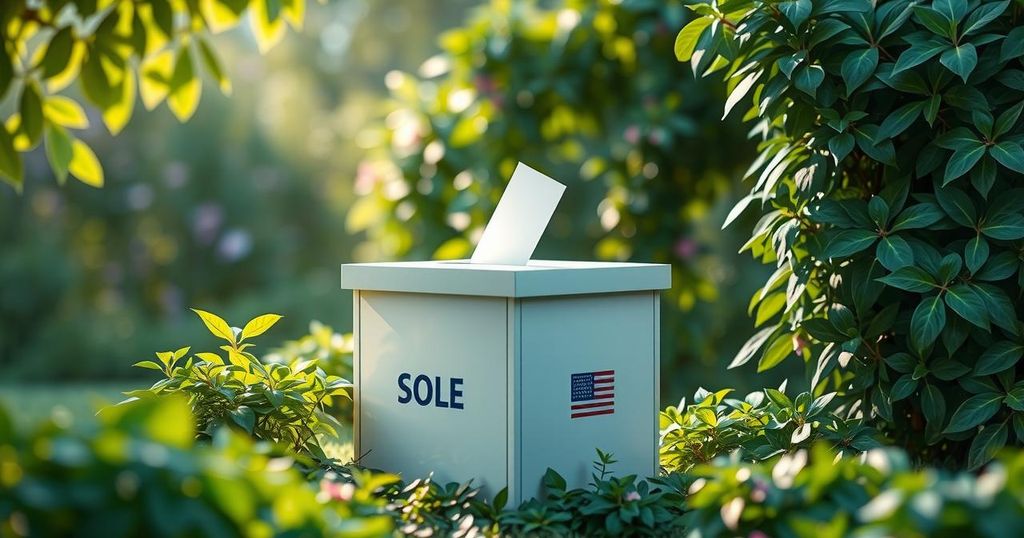Ecuador’s Presidential Election: Noboa Leads Amidst Violence and Economic Strain
Ecuador’s presidential election saw President Daniel Noboa with a slight lead at 45% over Luisa Gonzalez at 43%, likely leading to a runoff. The election addresses national security and economic stability amid a surge in cartel violence. Noboa’s presidency has been marked by stringent measures, including military deployment against crime, while Gonzalez’s campaign has rallied support amidst security fears and economic concerns.
President Daniel Noboa maintained a slim lead in Ecuador’s presidential election amid significant violence, facing a robust challenge from leftist candidate Luisa Gonzalez. With nearly half the votes tallied, Noboa secured approximately 45 percent while Gonzalez followed closely with about 43 percent. Both candidates appeared unlikely to achieve the necessary majority to avoid a subsequent runoff in April.
This election serves as a critical gauge of public sentiment regarding Ecuador’s struggling economy and the government’s stringent measures against rampant crime, which include murder, kidnapping, and extortion. Over the past few years, the nation has transitioned from relative safety to extreme danger, primarily due to escalating drug cartel violence.
During his tenure, Noboa has invoked a state of emergency, mobilizing military forces to combat this cartel escalation. On election day, robust security measures were implemented, including the deployment of heavily armed soldiers at polling stations and the closure of land borders with Colombia and Peru, following the assassination of a leading candidate in the 2023 elections.
Both candidates operated under significant security while canvassing, with armed special forces ensuring their safety. Gonzalez expressed her concerns, stating, “We’re only human, of course, you feel afraid.” Fortunately, this election day saw minimal infractions, primarily related to a prohibition on alcohol sales that was observed strictly.
With about half of the districts reporting, results were expected to take several hours to finalize, while Noboa’s supporters celebrated in major cities like Quito and Guayaquil. A supporter expressed enthusiasm for Noboa’s plans, declaring, “We came to support the president, we want him to support us and change the country!”
Political figures regard former President Rafael Correa’s influence favorably, with him urging Gonzalez’s supporters on social media to rally behind her campaign, stating, “We are going to PASS Noboa.”
At just 37 years old, Noboa represents one of the youngest leaders globally, relying on a dynamic social media strategy that highlights his youthful energy alongside his tough stance on crime. Contrasting with his hardline policies, he showcased a softer image through social media, presenting himself in casual attire while playing the guitar.
However, human rights organizations have voiced concerns regarding the potential for abuse stemming from the armed forces’ intensified presence in civil society. Political analyst Leonardo Laso noted, “Ecuador is in a very difficult moment, I think in the worst crisis since we returned to democracy.”
Tourism and foreign investment have dwindled due to the ongoing unrest, which has negatively impacted the nation’s economy. Noboa has sought assistance from the International Monetary Fund to address fiscal deficits, even as Gonzalez indicated willingness to work with the IMF, provided that policies do not adversely affect lower-income families.
Ecuador braces for the repatriation of thousands of migrants, resulting in a decline in significant remittance flows, which serve as vital economic support. Local merchants, recognizing the economic challenges ahead, lamented the rising unemployment and insecurity, with one stating, “It is a dark outlook.”
Approximately 13 to 14 million Ecuadorians were anticipated to cast their votes in this critical election. Should no candidate achieve the required majority during this round, a runoff between the top two candidates will be held on April 13.
Ecuador has experienced significant changes in recent years, with drug cartels transforming its landscape from one of safety into one of rampant violence and insecurity. President Daniel Noboa, who has been in office for 15 months, has instituted stringent security measures to combat this violence, including a state of emergency and military deployment. The current election holds profound significance, serving as a referendum on these policies and the state of the economy, particularly in light of a recession and concerns over fiscal stability.
The presidential election in Ecuador reflects broader concerns regarding crime, economic stability, and political allegiance. President Noboa’s leadership faces scrutiny as he navigates a precarious security environment and an economy under stress, while challenger Luisa Gonzalez gains unexpected support. Voter turnout will be pivotal in determining the future leadership of a nation grappling with significant challenges, with a potential runoff looming on the horizon.
Original Source: www.roanecounty.com




Post Comment